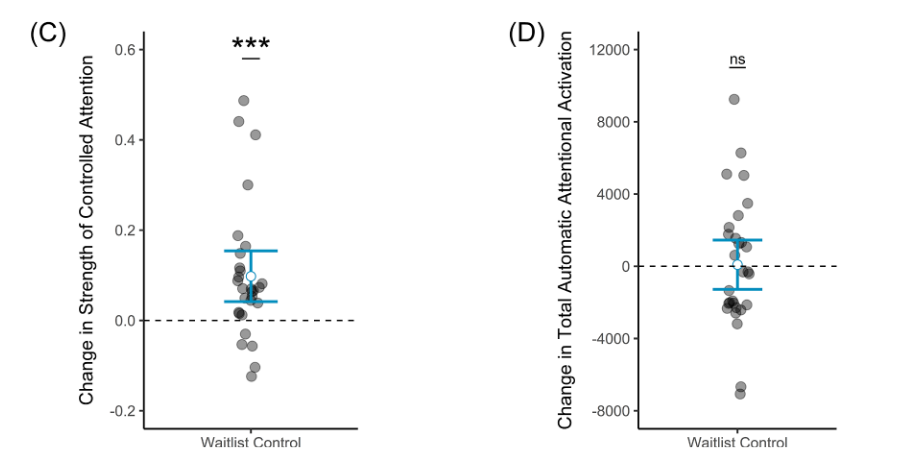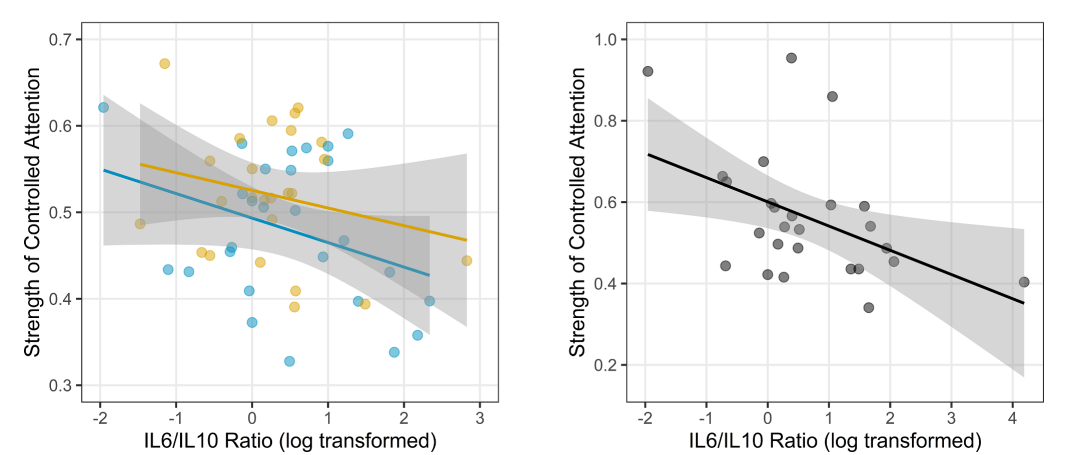Background Information
Although meditation is known to improve cognitive abilities like attention and interference control—the ability to ignore distractions—it’s still unclear exactly how these improvements occur. Cognitive enhancements from meditation might stem from increased control over attention (focusing intentionally on relevant tasks) or reduced distraction from irrelevant information. Additionally,
Inflammation
Inflammation is a biological response of the immune system to injury, infection, or stress, characterized by the release of signaling molecules called cytokines. Chronic inflammation is linked to impaired cognitive function, increased risk of disease, and accelerated aging.
More on Wikipedia
View in glossary
has been suggested as a physiological process that could influence cognitive performance. Prior research shows higher inflammation typically impairs cognitive functions, making it important to investigate whether meditation might also affect cognitive abilities by altering inflammation.
Controlled attention refers to the intentional, focused attention on relevant stimuli or tasks, while automatic attention is the involuntary response to distracting or irrelevant stimuli. Both processes play significant roles in cognitive performance, particularly in tasks that require ignoring distractions.
What They Did
Researchers conducted a study involving experienced meditators participating in a three-month intensive residential meditation retreat. Participants were randomly assigned to either start meditation immediately or wait as controls before participating in their own retreat later. To evaluate interference control, participants performed a
Flanker Test
The flanker test is a cognitive task used to measure interference control—the ability to focus attention on relevant stimuli while suppressing responses to irrelevant distractions. Participants respond to a central target stimulus surrounded by distracting ‘flanker’ stimuli. Performance on this task reflects the efficiency of controlled and automatic attentional processes.
More on Wikipedia
View in glossary
, where they had to identify target letters surrounded by distracting ones. Computational modeling was used to distinguish between improvements in controlled attention (focusing on relevant stimuli) and automatic attention (susceptibility to distractions). Additionally, blood samples were collected throughout the retreat to measure inflammatory activity (the balance between IL-6, pro-inflammatory, and IL-10, anti-inflammatory cytokines).
One Big Result
The most significant result was that participants on the meditation retreat demonstrated substantial improvements in controlled attention, enhancing their ability to maintain deliberate focus on relevant tasks despite distractions. However, notably, the retreat did not decrease automatic attention to distracting stimuli—participants continued to exhibit involuntary responses to irrelevant information, as demonstrated in the figure.

This outcome suggests a nuanced mechanism: meditation specifically strengthens intentional attention without necessarily reducing sensitivity to distractions. The implication is profound, as it indicates meditation training may primarily benefit executive control by reinforcing deliberate, goal-directed attentional processes. Rather than becoming less sensitive to distractions, meditators become more effective at intentionally focusing their cognitive resources. This finding challenges the assumption that meditation simply reduces distractibility, suggesting instead that it primarily enhances cognitive control through targeted improvements in deliberate attention.
These findings on specific attentional improvements align with the meta-analytic evidence from Zainal & Newman (2023) showing mindfulness training more strongly enhances cognitive accuracy than speed, particularly for executive attention tasks.
Miscellaneous Interesting Takeaways
Inflammation Predicts Cognitive Control
Participants with higher inflammatory activity consistently showed poorer controlled attention. This relationship appeared before and during the meditation retreats, suggesting that inflammation may independently impair cognitive control, rather than being directly influenced by meditation training itself.

The inflammation-attention relationship identified here complements work by Davidson, Kabat-Zinn et al. (2003) demonstrating meditation’s effects on immune function, suggesting potential bidirectional relationships between meditation, inflammation, and cognitive processes. Additionally, this finding relates to research by Jacobs et al. (2011), as both studies identify connections between biological markers and meditation’s psychological effects.
Citation
Shields, G. S., Skwara, A. C., King, B. G., Zanesco, A. P., Dhabhar, F. S., & Saron, C. D. (2020). Deconstructing the effects of concentration meditation practice on interference control: The roles of controlled attention and inflammatory activity. In Brain, Behavior, and Immunity (Vol. 89, pp. 256–267). Elsevier BV. 10.1016/j.bbi.2020.06.034